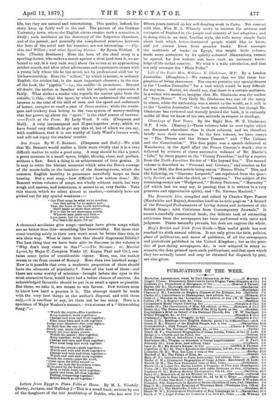Sea Songs. By W. C. Bennett. (Chapman and Hall.)—We wish
that Mr. Bennett would realise a little more vividly that it is a very difficult matter to write a good song. A song should be like a jewel, a great treasure in a small space, bright, shining, clear, and perfect, without a flaw. Such a thing is an achievement of true genius. It is easy to write the blatant nonsense which stirs the Dutch courage of the music-halls, or the inanities of the drawing-room, which the common English inability to pronounce mercifully keeps us from hearing. But a real song,—how difficult ! how seldom done! Mr. Bennett writes volumes of songs, not wholly without merit, but very rough and uneven, and sometimes, it seems to us, very feeble. Take this stanza, which we select almost at random,—certainly have not picked out for any special weakness :—
" Our Fleet must be what we're needing,
One that safety for us makes sure ; That, the force of the world undreading, Shall make us more than secure; For to this be our statesmen steady, Whoever may prate and fuss,— Love peace, but for war be ready, For that's the motto for us.''
A thousand accidents give songs—perhaps have given songs which are no better than this—something like immortality. But those that come trusting solely in their own merit must be better than this, to win their way. What is there here that should dispossess Dibdin ? The best thing that we have been able to discover in the volume is "Why don't they come to Sea ?"—The Bivouac : or, Martial Lyrist, by Major C. Compton Noake (C. Kegan Paul and Co.), con- tains some lyrics of considerable vigour. Here, too, the author seems to err from excess of fluency. More than two hundred songs ! How is it possible that even a moderate proportion of them should have the elements of popularity ? Some of the best of these—and there are some worthy of selection—brought before the eyes in the most attractive form, would have had a better chance of success. An acknowledged favourite should be put in as small a space as possible. But these, we take it, are meant to win favour. Few writers seem to know how hard a process it is. The attempt should be made with the very best things at the author's disposal, and with these only,—it is needless to say, let them not be too many. Hero is a specimen of Major Noakes's manner,—two stanzas of a "Skirmishing song :"—
" Watch the centre—files together
Keep together, work together—
Change and turn and front together ; Files must keep and work together.
Judge your distance—fine your sight—
In their face the sun is bright ; Steady aim, make doubly sure, Steady till your man's secure. Watch the centre; files together, Keep together, work together— Change and turn and front together ; Files must keep and work together.
Watch the centre—work together Watch and wait and work together— Change and turn and front together— Watch and wait and work together. Watch the centre—pass the word, 'Close upon the lifted sword'— . Close,' see now the horsemen come, Welcomed by the bullet's hum. Back to back, boys, stick together; Quick and form, all close together Falling. conquering together! British hearts go all together."


































 Previous page
Previous page